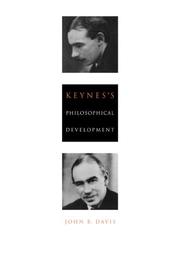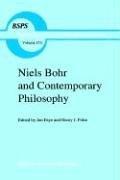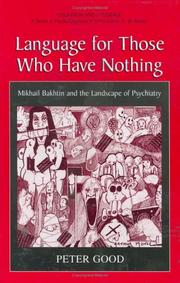| Listing 1 - 8 of 8 |
Sort by
|
Book
ISBN: 7800096475 Year: 2001 Publisher: 北京 时事出版社
Abstract | Keywords | Export | Availability | Bookmark
 Loading...
Loading...Choose an application
- Reference Manager
- EndNote
- RefWorks (Direct export to RefWorks)
Philosophy --- Scholars --- He, Xin, --- Views on philosophy.
Book
ISBN: 3892446334 Year: 2003 Publisher: Göttingen : Wallstein,
Abstract | Keywords | Export | Availability | Bookmark
 Loading...
Loading...Choose an application
- Reference Manager
- EndNote
- RefWorks (Direct export to RefWorks)
Philologists --- Bollack, Jean --- Bollack, Jean --- Bollack, Jean --- Views on literature. --- Views on philosophy.
Book
Abstract | Keywords | Export | Availability | Bookmark
 Loading...
Loading...Choose an application
- Reference Manager
- EndNote
- RefWorks (Direct export to RefWorks)
Rechts- und Staatswissenschaft- Geschichtswissenschaft - - Jura & Politikwissen. & Wirtschaft & Soziologie

ISBN: 0521419026 0521065518 0511522088 Year: 1994 Publisher: Cambridge Cambridge University Press
Abstract | Keywords | Export | Availability | Bookmark
 Loading...
Loading...Choose an application
- Reference Manager
- EndNote
- RefWorks (Direct export to RefWorks)
In this compelling book, John B. Davis examines the change and development in Keynes's philosophical thinking, from his earliest work through to The General Theory, arguing that Keynes came to believe himself mistaken about a number of his early philosophical concepts. The author begins by looking at the unpublished 'Apostles' papers, written under the influence of the philosopher G. E. Moore. These display the tensions in Keynes's early philosophical views, and outline his philosophical concepts of the time, including the concept of intuition. Davis then shows how Keynes's later philosophy is implicit in the economic argument of The General Theory. He argues that Keynes's philosophy had by this time changed radically, and that he had abandoned the concept of intuition for the concept of convention. The author sees this as being the central idea in The General Theory, and looks at the philosophical nature of this concept of convention in detail.
Methodology of economics --- Keynes, John Maynard --- Economics --- Philosophy --- Views on philosophy --- Keynes, John Maynard, - 1883-1946 - Views on philosophy. --- Business, Economy and Management --- Philosophy. --- Keynes, John Maynard, --- Keynes, J. Maynard --- Keynes, J.M.
Book
ISBN: 9781606087725 160608772X Year: 2010 Publisher: Eugene Wipf and Stock
Abstract | Keywords | Export | Availability | Bookmark
 Loading...
Loading...Choose an application
- Reference Manager
- EndNote
- RefWorks (Direct export to RefWorks)
This book investigates the formative years of Hans-Georg Gadamer's Plato studies, while studying with Martin Heidegger at Marburg University. It outlines the evolution of Heidegger's understanding of Plato, explains why his hermeneutical phenomenology inspired Gadamer, and, why his argument that Plato was responsible for Western civilization's forgetting the meaning of existence was a provocation. Heidegger's argument that Plato is an ontological dualist was crucial to the development of Gadamer's understanding of Plato. The book thus puts forward an argument for Gadamer's having indirectly refuted Heidegger's Plato. This involves re-examination of the relationship between Plato and Aristotle in matters of ethics, physics and truth. Above all, however, it is Gadamer's concept of Platonic dialectic that questions Heidegger's belief that Plato is a metaphysician. This challenge to Heidegger's Plato was commensurate with the origination of Gadamer's positive hermeneutical philosophy. In order to test the alleged openness of that philosophy to the other as other Gadamer's reading of the Republic is scrutinized by using the brilliant scholarship of Stanley Rosen. An examination of their interpretation of the Republic includes an inquiry into their intellectual influences. For Gadamer these include Hegel, the Tübingen school and Jacob Klein: for Rosen, the poetic genius of Leo Strauss. Rosen's mathematical and poetic orientation is then compared to Gadamer's dialectical approach to interpreting Plato. The mathematical approach dovetails with a theory of human nature and procedural rationalism in Gadamer's hermeneutical philosophy that explains why he, in contrast to Rosen, bypasses important dimensions of the Republic such as the significance of speakers and settings to understanding the text. This methodological shortcoming in turn calls into question the truth of Gadamer's method and with it, the foundations of a truly open and pluralist society. - Publisher info.
Plato --- Gadamer, Hans-Georg, --- Heidegger, Martin, --- Stanley, Rosen, --- Philosophy, Ancient --- Views on philosophy --- Plato. --- Philosophy, Ancient. --- Aflāṭūn --- Aplaton --- Bolatu --- Platon, --- Platonas --- Platone --- Po-la-tʻu --- Pʻŭllatʻo --- Pʻŭllatʻon --- Pʻuratʻon --- Πλάτων --- אפלטון --- פלאטא --- פלאטאן --- פלאטו --- أفلاطون --- 柏拉圖 --- 플라톤 --- Views on philosophy. --- Gadamer, Hans-Georg --- Heidegger, Martin --- Platon --- Platoon --- Платон --- プラトン --- Khaĭdegger, Martin, --- Haĭdegger, Martin, --- Hīdajar, Mārtin, --- Hai-te-ko, --- Haidegŏ, --- Chaitenger, Martinos, --- Chaitenker, Martinos, --- Chaintenger, Martin, --- Khaĭdeger, Martin, --- Hai-te-ko-erh, --- Haideger, Marṭinn, --- Heidegger, M. --- Haideger, Martin, --- Hajdeger, Martin, --- הייגדר, מרתין --- היידגר, מרטין --- היידגר, מרטין, --- 海德格尔, --- Chaintenker, Martin, --- Hāydigir, Mārtīn, --- Hīdigir, Mārtīn, --- هاىدگر, مارتين, --- هىدگر, مارتين, --- Gadamer, Hans-Georg, - 1900-2002 - Views on philosophy --- Heidegger, Martin, - 1889-1976 - Views on philosophy --- Stanley, Rosen, - 1924- - Views on philosophy --- Gadamer, Hans-Georg, - 1900-2002 --- Heidegger, Martin, - 1889-1976 --- Stanley, Rosen, - 1924 --- -Philosophy, Ancient

ISBN: 0792323785 9048142997 9401581061 Year: 1993 Volume: 153 Publisher: Dordrecht Boston Kluwer Academic Publishers,
Abstract | Keywords | Export | Availability | Bookmark
 Loading...
Loading...Choose an application
- Reference Manager
- EndNote
- RefWorks (Direct export to RefWorks)
Filosofie [Moderne ] --- Philosophie moderne --- Philosophy [Modern ] --- Philosophy, Modern. --- Physics --- Philosophy. --- Philosophy --- Bohr, Niels Henrik David, - 1885-1962 - Views on philosophy. --- Philosophy, Modern --- Modern philosophy --- Bohr, Niels, --- Boer, Niersi, --- Boerh, Niersi, --- Bohr, N. --- Bohr, Niels Henrik David, --- Bor, Nil's,

ISBN: 0306465027 9786610207497 1280207493 0306471981 Year: 2001 Publisher: New York : Kluwer Academic Publishers,
Abstract | Keywords | Export | Availability | Bookmark
 Loading...
Loading...Choose an application
- Reference Manager
- EndNote
- RefWorks (Direct export to RefWorks)
The aim of Language for those who have Nothing is to think psychiatry through the writings of Mikhail Bakhtin. Using the concepts of Dialogism and Polyphony, the Carnival and the Chronotope, a novel means of navigating the clinical landscape is developed. Bakhtin offers language as a social phenomenon and one that is fully embodied. Utterances are shown to be alive and enfleshed and their meanings realised in the context of given social dimensions. The organisation of this book corresponds with carnival practices of taking the high down to the low before replenishing its meaning anew. Thus early discussions of official language and the chronotope become exposed to descending levels of analysis and emphasis. Patients and practitioners are shown to occupy an entirely different spatio-temporal topography. These chronotopes have powerful borders and it is necessary to use the Carnival powers of cunning and deception in order to enter and to leave them. The book provides an overview of practitioners who have attempted such transgression and the author records his own unnerving experience as a pseudopatient. By exploring the context of psychiatry's unofficial voices: its terminology, jokes, parodies, and everyday narratives, the clinical landscape is shown to rely heavily on unofficial dialogues in order to safeguard an official identity.
Bakhtin, M. M. -- (Mikhail Mikhaĭlovich), -- 1895-1975 -- Contributions in psychiatry. --- Bakhtin, M. M. -- (Mikhail Mikhaĭlovich), -- 1895-1975 -- Views on philosophy of language. --- Psychiatry -- Philosophy. --- Bakhtin, M. M. --- Contributions in psychiatry. --- Views on philosophy of language. --- Medicine. --- Public health. --- Psychiatry. --- Linguistics. --- Sociology. --- Clinical psychology. --- Medicine & Public Health. --- Public Health. --- Clinical Psychology. --- Sociology, general. --- Linguistics, general. --- Psychiatry --- Language and languages --- Philosophy. --- Psychology, clinical. --- Criticism and interpretation. --- Linguistic science --- Science of language --- Social theory --- Social sciences --- Psychology, Applied --- Psychological tests --- Community health --- Health services --- Hygiene, Public --- Hygiene, Social --- Public health services --- Public hygiene --- Social hygiene --- Health --- Human services --- Biosecurity --- Health literacy --- Medicine, Preventive --- National health services --- Sanitation --- Medicine and psychology --- Mental health --- Psychology, Pathological --- Bachtin, Michail, --- Bachtin, Michail M., --- Baxtin, Mixail Mixailovič, --- Bakhtine, Mikhaïl, --- Bajtin, Mijail, --- Bakhtin, Mikhail Mikhaĭlovich --- Bakhtin, Mikhail Mikhaĭlovich, --- Bahŭchʻin, --- Bahtyin, M. M. --- Bahtyin, Mihail Mihajlovics, --- Bahtin, M. M., --- Bachtinas, M. --- Bachtinas, Michailas, --- Бахтин, М. М. --- Bahtin, Mihail, --- Bakhtin, Mikhail, --- Бахтин, Михаил Михайлович,

ISBN: 260000856X 9782600008563 Year: 2003 Volume: .62 Publisher: Genève : Droz,
Abstract | Keywords | Export | Availability | Bookmark
 Loading...
Loading...Choose an application
- Reference Manager
- EndNote
- RefWorks (Direct export to RefWorks)
Montesquieu fit œuvre originale d’historien. Ses Considérations sur les causes de la grandeur des Romains et de leur décadence suffiraient à établir la modernité de sa démarche historique. Vanessa de Senarclens revoit pourtant l’ensemble de son œuvre et examine tout autant les recueils de notes, tels les Pensées, les Voyages et le Spicilège en sorte de recouper les principales notions associées au topos romain dont traite Montesquieu. Celles-ci instruisent successivement l'effet politique de Rome sur la France après le règne de Louis XIV, la spécificité de l'histoire romaine divulguée par l’herméneutique qu’en fait le dix-huitième siècle et, enfin, les implications épistémologiques de cette dernière dans la conceptualisation de l'histoire moderne. Si Montesquieu est le "jurisconsulte", cherchant à comprendre "l'esprit des lois", il est aussi l'historien des nations et, en l'occurrence, l'historien de la civilisation de référence que constitue l'ancienne Rome. Sa réflexion sur les lois est indissociable de sa contribution à un statut moderne pour l'histoire.
Historiography. --- Historiographie --- Montesquieu, Charles de Secondat, --- Rome (Italy) --- Rome (Italie) --- History --- Histoire --- Historians --- Mengdesijiu, --- Mongtētkiʻǣ, --- Monteskʹe, Sharlʹ Lui, --- Monteskīĭ, --- Monteskiusz, --- Monteskiyü, --- Monṭesḳyeh, --- Montesquieu, --- Montesquieu, Charles Louis de Secondat, --- Montesquiou, --- Montesukyū, --- Muntisikyū, --- Secondat, Charles-Louis de, --- מונטסקייה --- モンテスキウ̄, --- 孟德斯鳩, --- Criticism and interpretation. --- Rome --- de Montesquieu, Charles-Louis de Secondat, --- Historien --- --Historiographie --- --Rome ancienne --- --France --- --XVIIIe s., --- Considérations sur les causes de la grandeur des Romains et de leur décadence --- --Montesquieu, Charles de Secondat --- Knowledge --- Montesquieu, Charles de Secondat --- Views on philosophy of history --- Historiography --- Early works to 1800 --- --Historians --- --Historiography. --- Historians - France - Biography. --- Rome ancienne --- XVIIIe s., 1701-1800 --- de Montesquieu, Charles-Louis de Secondat, 1689-1755 --- France --- MONTESQUIEU (CHARLES DE SECONDAT, BARON DE LA BREDE ET DE), ECRIVAIN ET PHILOSOPHE FRANCAIS, 1689-1755 --- HISTORIOGRAPHIE --- ROME --- CRITIQUE ET INTERPRETATION --- FRANCE --- 18E SIECLE
| Listing 1 - 8 of 8 |
Sort by
|

 Search
Search Feedback
Feedback About UniCat
About UniCat  Help
Help News
News